Some people do not always understand the life-saving power or impact of education. Education is a valuable source that can help students through tough situations.
This is especially true when climate change causes starvation where you live. It has dried the soil where farmers used to grow crops. Children in developing countries face malnutrition. However, because of life-saving foreign aid these children may attend school because of the food that the school provides for them guest speaker and CRS employee Thomas Awiapo said.
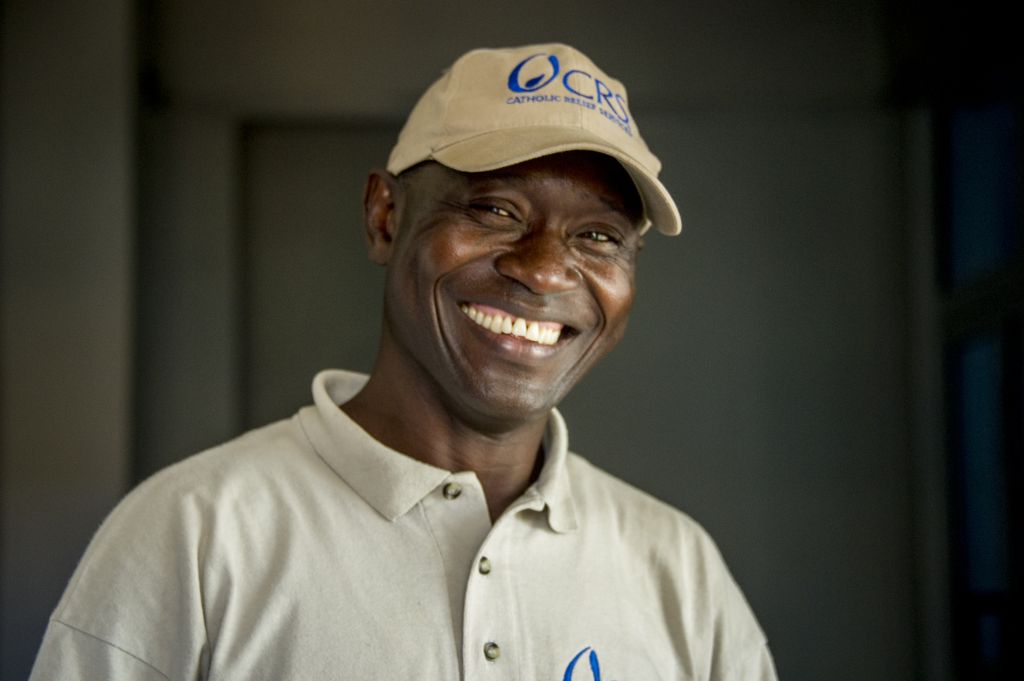
“Education is simply liberation. If it wasn’t for that little snack, I would have never gone to school,” Awiapo told the ECG 300 Working for Global Justice class.
Cabrini University offers courses that help their students engage with the common good through courses also known as ECG courses. These courses touch on serious topics that are happening globally. They help students try to find solutions to these problems. Some classes offer the students the opportunity to lobby and help give a voice to the voiceless.
Malnutrition is one of the leading causes in child death in Ghana. According to Unicef, it leads to one-third of childhood deaths. In Northern Ghana where Awiapo is from, two in every five children are stunted and 80 percent of children are anemic. The percentages are likely to rise.
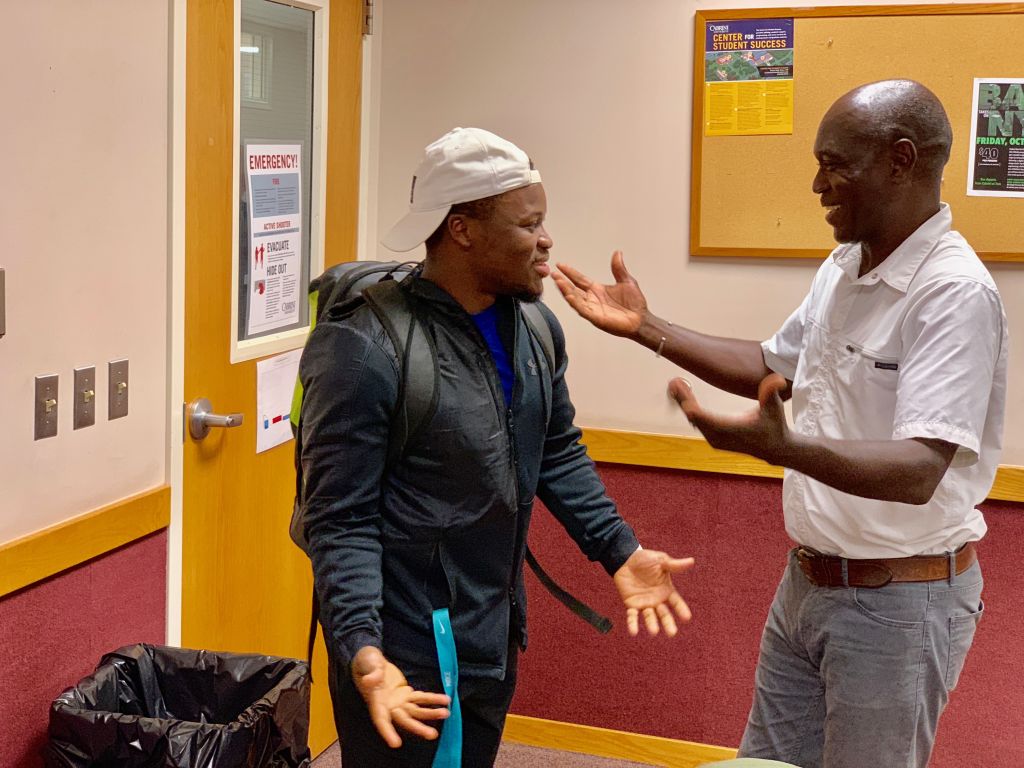
“Just how he was convinced to go to school as a kid, he would now take that trick and use it himself, by providing hot meal and snacks to children that attend school,” senior Jared Delisa said.Dr.
Awiapo spoke to a group of students at the end of September to tell his personal experience with malnutrition and how climate change has affected his village.
“We need to change our ways now or the world will be terrible for future generations to come. Climate change is VERY REAL,” junior psychology major Cheryl Ford said.
Dr. Jerry Zurek’s Working for Global Justice course provides the opportunity to educate students on migration, modern slavery and climate change. At the end of the semester the students will lobby in Washington. D.C. Awiapo was able to share his story with the students to express the reality of climate change.
“Climate change, especially how it affected Thomas in Ghana, is clear to see how an area that was once filled with so much green is now drying up and becoming baking dirt in the sun,” Delisa said.
Early Life
Awiapo grew up in a small village in the northern part of Ghana. His village did not have electricity or running water. His parents died before he was 10 years old. He and his four younger brothers were orphaned and had to find ways to live on their own.
They grew up with a lot of anger built inside. He was the second oldest of his siblings. In their time of suffering Awiapo and his brothers constantly fought and cried for food. Trying to survive in his village was not the end of his pain. His two youngest brothers died of malnutrition and his oldest brother ran away and never went back. Awiapo found himself trying to survive alone in his village. Just when he lost hope, something unexpected happened.
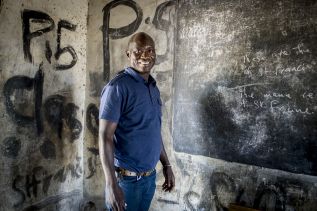
“I grew up with the pain not knowing what it means to have a parent,” Awiapo said.
Catholic Relief Services found a way to the small village in Ghana and built a school. In the beginning, Awiapo had struggled attending school. He did not like going but what helped him and the other children in the village to attend, were the snacks that the school provided daily.
“I loved the snack but I hated school so they tied them together,” Awiapo said.
Education leads to Liberation
Because of the opportunities CRS provided, he continued to attend school. Awiapo was able to survive, finish school
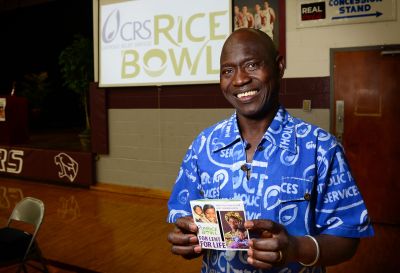
and further his education. CRS helped Awiapo win scholarships so he could attend college. Awiapo earned his Master’s degree in public administration from California State University. Now, Awiapo has been working in CRS for 15 years.
‘Thomas’ story impacted me because I got to hear first hand how he is able to help many people in need with emergency relief aid,” Ford said.
He works with Rice Bowl at CRS and with other Global Solidarity groups there. The Rice Bowl’s mission is to call on Catholics to perform a simple act of Lenten sacrifice. They will have to substitute a low-cost meatless meal for more expensive dining once a week during Lent and put the money saved in a cardboard rice bowl.
At the end of Lent, the funds that were collected in the rice bowls, are distributed both around the world and in local communities to combat hunger.
As he continues working for CRS, Awiapo has moved back to Ghana. There he has his wife and four children. Awiapo explained that through his hardships and his achievements he can now provide food and shelter for his family in Ghana.
His children are also attending school because Awiapo has experienced first hand on how education can help you through tough situations.
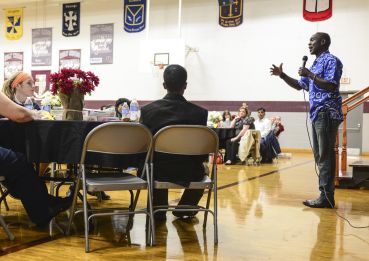
“I now know the value of education,” Awiapo said. “My children will never be hungry again.”
In the world of so many challenges, Awiapo believes that just a little act of kindness can save someone’s life and make a change. It is better to teach the children skills to use in their villages rather than show them. He mentions how giving a fish to the children is good, but to teach them how to catch the fish is even better because they can use that on a day to day basis.
“Give them the skills and tools to catch the fish so they can catch fish for the rest of their lives,” Awiapo said.
He has traveled to 49 states so far to say thank you to U.S food programs such as Food for Education, Food for Peace and Food for Health as his mission.
“Sometimes it’s important to see a face and hear the word thank you,” Awiapo said.
“That’s my mission here.”



